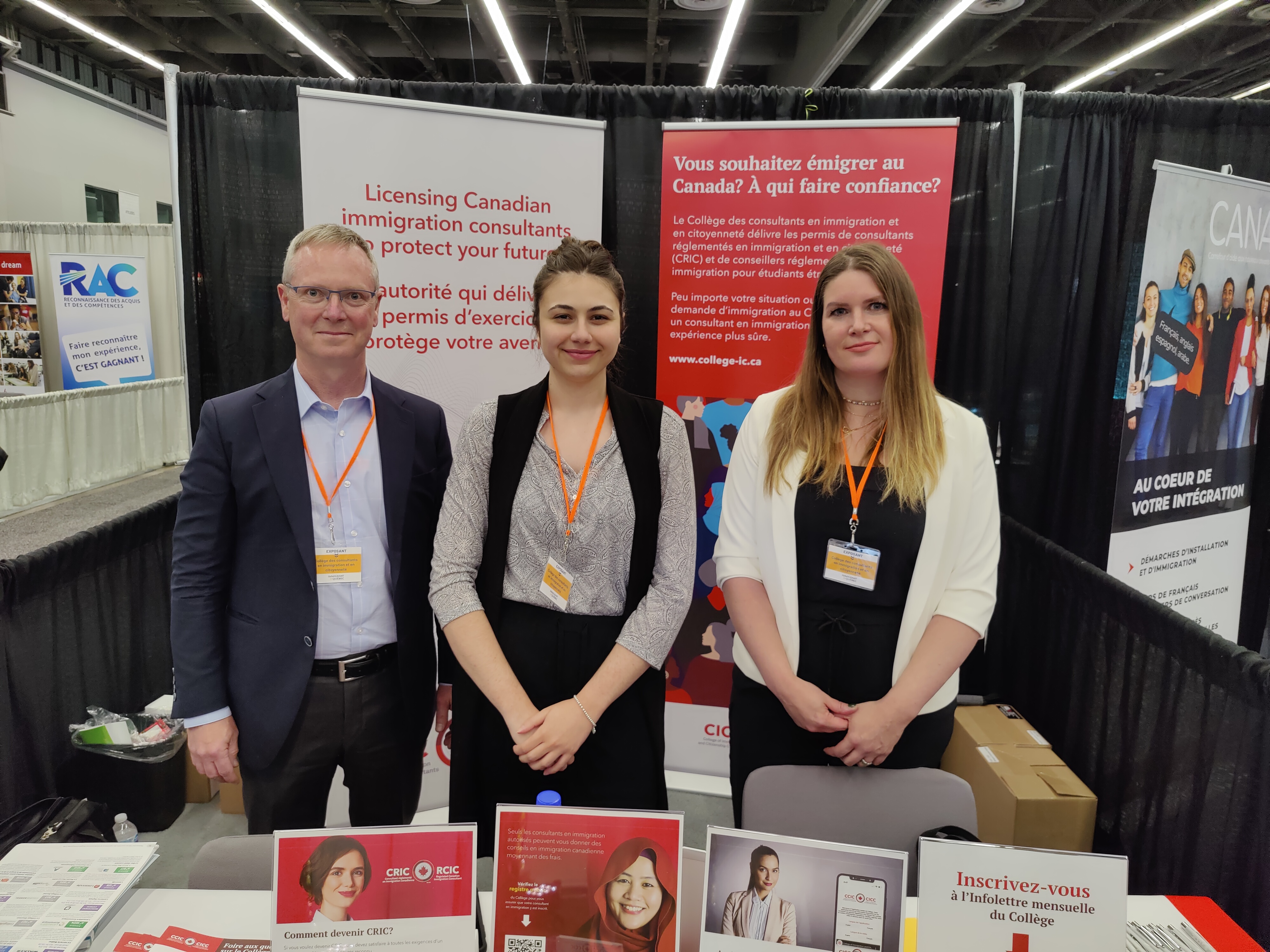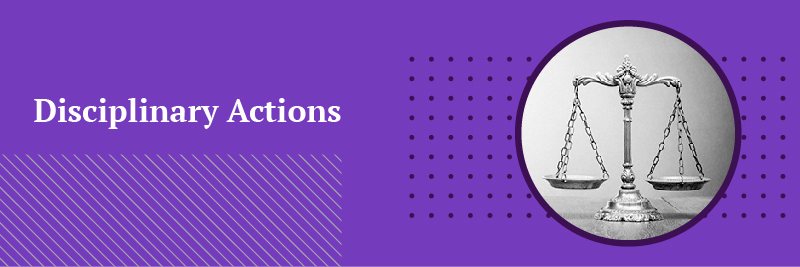
In this edition:

New Code of Professional Conduct for The College Licensees now in effect
On June 22, 2022, the Government of Canada published the Code of Professional Conduct for College of Immigration and Citizenship Consultants Licensees (Code). The new Code is effective as of June 10, 2022.
Section 43(1) of the College of Immigration and Citizenship Consultants Act (S.C. 2019, c. 29, s. 292)(College Act) requires the Minister to establish a code of professional conduct for licensees. In May of last year, IRCC released a draft of the Code for public comment. The College hosted webinars for licensees to give an overview of the proposed Code requirements and elicit comments for transmission to IRCC. Many of these comments were accepted by IRCC, with the result that the new Code, now in effect, is substantially different from the draft provided in May of 2021. Licensees should review the new Code carefully!
The new Code sets out strong ethical and professional standards that must be met by all College licensees (RCICs and RISIAs). The Code replaces the previous RCIC Code of Professional Ethics and the RISIA Code of Ethics. Where a provision of the new Code conflicts with a College By-law or Regulation, the Code provision governs.
The new Code comprises 9 sections, each with a number of detailed provisions:
- Interpretation
- Purpose and Application
- General Standards
- Relationship to Clients
- Office Administration and Management
- Relationship to the College and Other Persons
- Marketing of Immigration or Citizenship Consulting Services
- Transitional Provision
- Establishment and Coming into Force
The College is developing an Interpretation Guide to assist licensees in fully understanding and applying the provisions of the Code. The College will also provide webinars and other information resources for licensees in due course.
More information will be made available soon.

Board of Directors Meeting In-Person / Zoom
June 10, 2022
Highlights
The Transitional Board of Directors of the College held a Board orientation on June 9, 2022, and its first formal meeting on June 10, 2022. All directors attended except for the most recent appointment, Ms. Jyoti Singh. Alexis Graham, Director, Social and Discretionary Policy and Programs, IRCC, the ministerial observer appointed pursuant to s. 76 of the College Act, and a representative from Goodman Mintz, LLP, auditors of the Council, also attended. At the formal Board meeting, the following motions were passed:
- The Audited Financial Statements of the Council for the period July 1, 2021 – November 22, 2021 , were approved.
- Goodman Mintz, LLP, Chartered Professional Accountants, Licensed Public Accountants, were appointed as the Auditors of the College for the financial year of the College ending June 30, 2022.
- The College budget for the coming financial year was approved.
- The date set out in By-law s. 10.4(a) upon which RCICs wishing to represent clients before the tribunals of the Immigration and Refugee Board of Canada must have completed the College’s Specialization Program was fixed by Board resolution as July 1, 2023.
- Terms of Reference for the Finance and Audit Committee and Governance and Nominating Committee of the Board were approved and Directors were appointed to serve on each.
- Terms of Reference for a new Mentoring Working Group and a new Professional Standards of Practice Working Group were approved and licensees and subject matter experts were appointed to serve on each.
- RCICs and public representatives were appointed to serve on the College’s Tribunal Committee.
- Ms. Lai-King Hum was appointed as the Independent Complaints Review Office for the College.
The full minutes of the Board meeting will be posted on the College website upon approval by the Board at its next meeting.
Note that Board meetings are open to the public and licensees who wish to observe. Next Board meetings are scheduled on September 29, 2022 and March 9, 2023 with the Annual Meeting of Licensees taking place on December 1, 2022.
Instructions on how to register will be posted here closer to those dates.

Licensee Insignias and the Importance of Proper Insignia Use
The new RCIC or RISIA Insignia have been developed to reinforce the image of the profession and give potential clients the assurance that you are authorized to practise. Proper Insignia usage increases brand awareness and reduces consumer confusion.
Do not use the CICC corporate logo on your website.
Download the RCIC or RISIA Insignia and before use, read the following:
Frequently Asked Questions
What is the difference between the College corporate logo and the licensee Insignia?
The College corporate logo reflects the national organization and its role as a regulatory and licensing body. Licensees cannot use the College’s corporate logo nor the previous Council’s corporate logo or RCIC Insignia.
The licensee Insignia is for use by RCICs and RISIAs. It is a similar approach to the designations used by professionals in other fields, including financial services and real estate. RCICs and RISIAs will use ONLY the newly developed RCIC or RISIA Insignia to show that they are a regulated professional and a licensee in good standing with the College.
How can I know if I’m using the Insignia appropriately?
Utilizing the licensee Insignia correctly is essential for the promotion of brand awareness and recognition.
To start, only use an image of the Insignia that you downloaded from the Login section of our website and click on the Log in button under “Licensee Insignia”. This ensures you have a high-quality image of the Insignia in the correct colour versions that are allowed. Do not edit or change the Insignia in any way.
The placement of the Insignia on a website must include your name which must be situated immediately adjacent to the Insignia, but not interfering with or in any way altering the appearance of the Insignia. Further, your name must be in the exact form as it appears on your Licensing Certificate, and the webpage must include the wording "Verify Status with the College of Immigration and Citizenship Consultants" in English or “Vérifiez le statut auprès du Collège des consultants en immigration et en citoyenneté” in French. Such wording must contain a functioning hyperlink which connects to the College Public Register webpage.
What are the permissible uses of the Insignia?
As a licensee in good standing, you may use the Insignia to advertise and promote yourself as a regulated professional and licensee of the College. You may use the Insignia on a variety of marketing and communication tools, including your letterhead, business cards, email signature block, and your website. You may also use the Insignia in your display and banners, social media, presentations, publications, and advertising to indicate that you are a licensee of the College in good standing.
Can my Agent or staff members use the Insignia?
No, the Insignia is not transferable. The Insignia shall not be used by those who are employed by RCICs, but are not themselves RCICs. It is intended for use only by licensed RCICs or RISIAs.
I found someone violating the Logo Use and Associated Trade-Marks Regulation, to whom can I report this?
Thank you for helping ensure that all licensee Insignias are used appropriately and according to the Logo Use and Associated Trade-Marks Regulation and Insignia Usage Guidelines.
Should you find someone is violating the Regulation, please send an e-mail to info@college-ic.ca noting the details of misuse, or in the case of a website or a webpage, a link where we may investigate the matter.
I have seen the College’s corporate logo appearing on several websites, to whom can I report this?
Proper use of all the College’s logos is very important. Should you believe that someone is violating the Logo Use and Associated Trade-Marks Regulation, please send an e-mail to info@college-ic.ca.
IRB practice restriction deadline extended to July 1, 2023

The Board of Directors of the College, in consultation with the Immigration and Refugee Board (IRB) has extended the deadline for the IRB practice restriction until July 1, 2023.
After this date RCICs will be required to hold the RCIC-IRB class of licence if they wish to represent clients before the IRB and attend a hearing.
To obtain the RCIC-IRB class of licence, licensees (except for graduates of the Graduate Diploma Program and paralegals actively registered with the Law Society of Ontario) must comply with the Specialization Program.
The deadline extension will ensure that all those currently enrolled in one of the program pathways and those who enroll promptly will have the opportunity to complete the program requirements, write the exam and obtain the RCIC-IRB class of licence before the new deadline.
Complying with the Specialization Program and the exam enrollment
It is important that RCICs who choose to enroll adhere to the Specialization Program requirements. Any non-compliance could push out their completion date.
- Not attending the cohort’s tutorial
o Tutorials are mandatory. You will fail the program if you do not complete the tutorial. This applies only to Education and Hybrid pathways
- Dropping a course
o You cannot drop or defer a course. You are assigned to a cohort. Any change to your participation will cause you to be withdrawn from the cohort. You will then be placed in a different cohort, with a later date.
- Exam attendance
o It is up to you to choose an exam date that fits your schedule.
- Program Fee payment
o Payment is to be made by credit card.
o Program fees must be paid in full before we can register you into a pathway cohort.
o All exam fees are due within 72 hours of being invoiced.
o If you do not pay your fees in a timely manner, your exam application will be declined for non-payment.
Resources
Questions?
Please email sp@college-ic.ca.
REGISTER HERE
Reminder
Annual Renewal
Deadline to complete the Annual Renewal Form is June 30, 2022, 23:59 pm ET.
How do I complete the Annual Renewal Form?
All the information you need (Information Sheet, link to the Form, and FAQ) is available on our website. Go to the Login section, click on “Log in” under “2022 Annual Renewal”, and follow the instructions.
Note: For your annual renewal process to be considered complete, you will also need to pay your annual fees invoice when you receive it at the beginning of July.
Who must complete the Annual Renewal?
All licensees except those on a medical leave of absence, a retirement leave of absence, or whose status is listed as “resigned”.
What is the penalty for submitting the Annual Renewal Form late?
Late submissions will be subject to a $100 fine.
What happens if a licensee is not compliant and/or does not submit their Annual Renewal Form?
A licensee may face suspension of licence.

Gaining Practical Experience
Why is practical experience valuable?
Many regulatory bodies require that their professionals gain some sort of practical experience. This is viewed as a way to standardize the quality of practice and to help new licensees succeed in their careers.
Why was the mentoring model chosen?
Following a survey-based study, and due to the structure of the profession (mainly sole practitioners), it was determined that a period of mandatory mentoring for new licensees would be the most suitable form of practical experience.
Does the mentoring program only apply to new licensees?
The New-Licensee Mentoring Program (Supervised Practice Stream) will be mandatory for new licensees who receive their Letter of Authority on or after July 1, 2022. The New-Licensee Mentoring Program will pilot this fall.

Evolution of a Profession
Since the launch of the College last fall, our licensee base has grown impressively. With now over 10,000 RCICs and 300 RISIAs, the public expects high standards of advice and service associated with these professional designations.
Characteristics of a Profession
Self-regulation is a privilege granted to professions that show they can put the interests of the public ahead of their own. With that privilege comes the responsibility to know and meet the professional and ethical obligations demanded of an immigration and citizenship consultant. As such, it is worth reviewing the characteristics of a profession and the requirements that professional status places on the individual professional.
- Professionals acquire an identified skill acquired through education and/or training;
- Professionals apply the skill through personal service to assist others (clients) for compensation;
- Professionals maintain an essential “objectivity” while providing services;
- Professionals accept that personal interests must be subordinate to those of the client and the public interest generally;
- Professionals belong to an established body that sets and maintains professional standards, and assures the continued competence of practitioners and the competence and ethical standards of the profession as a whole; and
- Professionals follow a code of ethical conduct, established and enforced by the professional body, aimed at protecting the public.
In addition to these characteristics, there is also an understanding and acceptance by all of a duty to promote and support the development of their profession and fellow professionals. Professionals live up to the expectations of their colleagues, their clients, and the expectations of their regulator by exercising the principles of professionalism.
Principles of Professionalism
- Professional behaviour – Conduct must reflect well upon you as a professional and your profession as a whole;
- Duty of good faith – Act in the client’s best interest;
- Integrity – Act in an honest and straightforward manner;
- Objectivity – Exercise sound professional judgment
- Competence – Gain and maintain the skills you need.
Licensees of the profession and the regulator play equal roles in maintaining the public’s trust and respect. The College’s role as the regulator in maintaining public trust in the profession is to protect the reputation of the profession and “keep the badge shiny.” The College does so by ensuring entrants to the profession are properly trained and are of good character, and that licensees meet ongoing regulatory obligations and maintain continued professional development.

RCIC appointed as an IRB Member
Congratulations to RCIC Mihaela Kerezova for her appointment as an IRB Member to Canada's largest independent administrative tribunal established by the Parliament of Canada.
Ms. Kerezova has been an RCIC for almost 10 years and worked as an RCIC Advisor for over 2 years in the College's Professional Conduct department. In her role as an RCIC Advisor, she served as a subject matter expert on complex immigration pathways and relevant risk assessment tools for the staff to ensure they can properly investigate and evaluate the merits of a complaint.
“In addition to her expertise about new immigration programs, recent policy changes, and the practical realities of working as an RCIC, Mihaela brought to the Professional Conduct Department a balanced perspective to the review of complaints. This helped our team better appreciate the diverse opinions – those of the client, the licensee, and officers/adjudicators – and fairly evaluate what contributed to the disagreements,” said Michael Huynh, Director of Professional Conduct.
Mihaela Kerezova was appointed as a Member at the IRB in May 2022.
Outreach Activities

Left to right: Chris May, Director, Public Affairs and Communications, Sabrina Cigana, Public Affairs Coordinator and Martine Des Landes, Translator
Staff from the College recently participated in several virtual and in-person outreach events.
Canadian Immigrant Fair (Halifax) – May 3
At the College’s booth, Chris May, Director Public Affairs and Communications and Sabrina Cigana, Public Affairs Coordinator spoke with newcomers about fraud prevention and the College’s public register, and with licensees based in the East Coast. The fair provided a great opportunity for licensees to connect with individuals looking for authorized immigration advice. Immigrants seeking immigration advice were encouraged to visit the booth of Umka Immigration Consulting who were also exhibiting at the fair.
Snapshots of Canadian Innovation (virtual) – May 19
The Snapshots of Canadian Innovation organized by the Parliamentary Internship Programme (PIP) invited PIP sponsors to present on their respective field’s innovative practices. Chris May talked virtually about the launch of the College, as well as the organization’s approach to digital communications and stakeholder engagement.
Salon de l’immigration et de l’intégration (Montréal) – May 25-26
Guy Morissette, Coordinator, Support and Licensing, and the College’s two translators Martine Des Landes and Christiane Cicioli joined Chris May and Sabrina Cigana in Montréal at the Salon de l’immigration organized by Immigrant Québec. They discussed with attendees the College’s mandate to protect the public interest and the importance of working with a licensee in good standing. Immigrants looking for further immigration information were advised to check out the booth of Services d’immigration DJP du Québec who were also in attendance.
National Citizenship and Immigration Conference (NCIC) (Ottawa) – May 26-27
Chris and Sabrina attended the NCIC held annually by the Canadian Association of Professional Immigration Consultants (CAPIC). At this year’s conference themed Commitment to Excellence: Strategies, Solutions and Successes: The Next Chapter, John Murray, President and CEO of the College, presented on the evolving practice and industry of the immigration consultant profession. John Murray highlighted the College’s important role as the regulatory body responsible for setting the standards of professionalism and competence for licensees.
Transitional Board Directors Stan Belevici and John Burke also attended and engaged with licensees who visited our booth. They answered questions about the College’s transition, Annual Renewal, CPD hours, and the Specialization Program. Licensees who visited the booth picked up cool College swag like pens, notepads, and mugs. The College’s new consumer guide and posters were also available for licensees to take for their offices.
RCIC Club AGM (Montréal) – May 29
The RCIC Club hosted their 2022 AGM, bringing together members of the club and immigration industry stakeholders. Lily Lee, RCIC and RCIC Club President, invited the College to present on the transition to the College and the Specialization Program. Chris May virtually spoke to licensees about the College’s new regulatory authority and the launch of the RCIC-IRB class of licence which will be required of any RCIC practising before the Immigration and Refugee Board (IRB).

Overheard at an immigration conference…
RCIC 1: Did you hear that he was charged for fraudulent activities tied to him selling unnamed LMIAs from way back in 2014? They ransacked his house and office and took everything.
RCIC 2: No, but I am not surprised. He was always telling me about his elaborate schemes, how much cash he was making, and how he now did not even need the employer to be aware. He contacted me a couple years back through the Listserv asking me to send him and his colleague any of my clients that were interested and could afford their hefty fees.
RCIC 1: Wait. Did you tell anyone?
Sound familiar? If you have not already, please let us know your experience and views on handling potential misconduct of fellow RCICs. In a few short minutes, you can help us shape the future of the consultancy profession for the better.
Survey
Your opinion matters
CLICK HERE

The College is looking for some talented professionals to join our team.
Do you or someone you know want to be part of a team that protects the public by overseeing regulated immigration and citizenship consultants and international student advisors?
Interested in this opportunity? Submit your resume and a brief cover letter indicating why you feel you are a fit for the role.
For more information on this position and the most up-to-date College career postings, visit the College's Career page.

Career Opportunities at Queen’s University
Queen’s University Faculty of Law is accepting applications for instructors in the Graduate Diploma in Immigration and Citizenship Law (GDipICL) to be offered in the 2022-2023 academic year.
The GDipICL (in English only) and the D.E.S.S. en réglementation canadienne et québécoise de l’immigration offered by the Université de Montréal (in French only) are the only educational pathways for individuals who want to become RCICs.
Courses
ICL 810 – Foundations of Canadian Immigration Law
ICL 820 – Ethics and Professional Responsibility
ICL 830 – Temporary Entry
ICL 840 – Economic Immigration
ICL 850 – Family Class Immigration
ICL 860 – Refugee Protection & Trauma-Informed Client Service
ICL 870 – Enforcement – Inadmissibility, Detention and Removal
ICL 880 – Citizenship
ICL 890 – Immigration Practice Management
Application deadline
June 28, 2022
Interested?
If you are a practising RCICs in good standing with a minimum of 5 years’ experience, send all documents in your application package electronically as a PDF, addressed to Sharry Aiken, Academic Director, Graduate Diploma in Immigration Citizenship Law, Queen’s University Faculty of Law to:
Lisa Latour Colby, Director, Human Resources
Queen’s University, Faculty of Law
Telephone: 613-533-6000 ext. 75068
Email: lawpositions@queensu.ca
For more information, visit https://law.queensu.ca/careers/careers-at-queens-law/sessional-appointments

The College’s Tribunal Committee is an independent adjudicative committee that hears and decides regulatory cases about an RCIC in accordance with the College’s core values of fairness, transparency, and public protection.
Below are summaries of the most recent decisions of the Tribunal Committee. Full decisions are available, without charge, on the Canadian Legal Information Institute’s (CanLII) website at: https://www.canlii.org/en/ (please enter “ICCRC” or “College of Immigration and Citizenship Consultants” in the “Document text” field).
|
Discipline Committee Decision
|
|
Licensee
|
Anupama Madanan Nair, R514381
|
|
Company Name/Location
|
Novus Canada Immigration Services Inc. and National Canada Immigration Services
Surrey, BC
|
|
Proceedings
|
Written Discipline Hearing
|
|
Finding
|
The College and the RCIC filed a Settlement Agreement Application in writing. The RCIC admitted her conduct was in violation of the Code of Professional Ethics and accepted full responsibility for her misconduct.
The RCIC was retained by the client to file an application for permanent residence with the British Columbia Provincial Nominee Program “BC PNP”. The client paid the RCIC, however received no retainer agreement. The RCIC completed and submitted the application to BC PNP; however, failed to confirm details of the application with the client before submitting it. She entered incorrect information and did not complete a Use of Representative Form nor register herself as the client’s immigration representative, and failed to provide the client with login details for the BC PNP application portal.
The RCIC created an email account in the client’s name for the purpose of the BC PNP application, without the client’s consent and without providing him with the account information. The client informed the RCIC his current employer had changed and asked the RCIC about updating the BC PNP about the change. The RCIC, however, failed to update the BC PNP program of the change and advised the client he did not require to update the application.
The client informed the RCIC he no longer wanted the RCIC to represent him and requested several times for the RCIC to share the BC PNP application portal login information, including the password. The RCIC failed to respond to the client’s communications and failed to provide the requested information. As a result of the RCIC’s failure to update the BC PNP on the client’s employment status, the client needed to withdraw his application and start a new one.
|
|
Outcome
|
The RCIC is to make restitution to the client in the amount of $500 within 30 days of the date of the Discipline Committee Order; pay a fine to the College in the amount of $1,000 and within 60 days from the date of the Discipline Committee Order and be reprimanded, and the RCIC is to complete the Retainer Agreement and Client File Management PME courses within 12 months of the date of the Discipline Committee Order.
|
|
Costs
|
The RCIC is to pay costs to the College in the amount of $1,000 within 90 days of the date of the Discipline Committee Order.
|
|
Discipline Committee Decision
|
|
|
Licensee
|
Anuraj Sandhu, R418399
|
|
Company Name/Location
|
Canam Consultants Ltd.
Chandigarh, India
|
|
Proceedings
|
Oral Disciplinary Hearing
|
|
Finding
|
The client hired Canam Consultants Ltd. to assist with a permanent residence application. No retainer agreement was issued. The agency staff uploaded the Express Entry profile using the agency email; however, no Use of Representative Form was completed. The agency submitted the application to the Ontario Immigration Nominee Program (OINP). The client paid additional fees prior to the application being submitted. The client noticed the agency did not disclose itself as the immigration representative on the OINP application and when the client contacted the agency to inquire about that, he received no response.
OINP emailed the client to indicate that several other applicants used the same contact information as his and requested that he respond. The client reached out to the agency who advised him to tell OINP that he received unpaid advice for preparing the application. The client advised the agency that their response was misleading. The client wrote to OINP saying that he retained the agency who had completed the OINP form in that manner. OINP informed the client that the matter would be referred to the Program Integrity Unit for further verification. OINP was concerned that the client had used undeclared representatives and that this was considered misrepresentation.
During the application process, the client received advice, instruction and direction from agents of the agency who were not licensees of the College. The RCIC did not oversee the processing of the client’s application.
The Discipline Panel concluded that the RCIC had breached the following articles and sections of the Code.
2012 Code – Articles/Sections 2.2.8(ii), 2.2.8(iv), 3.1, 3.2, 4.1, 4.2, 4.5, 6.2, 7.1, 7.3, 7.4.(1, 2, 3, 4, 5), and 7.5.
2016 Code – Articles/Sections 3.1, 6.3.1, 7.1 and 7.2.
|
|
Outcome
|
The RCIC is to serve a 3-month Disciplinary Suspension commencing March 31, 2022, and within 3 months, is to take the College Practice Management Education (PME) course on Ethical Practice.
|
|
Costs
|
The RCIC is to pay costs to the College in the amount of $15,520 by June 29, 2022.
|
|
Discipline Committee Decision
|
|
|
Licensee
|
David Weinshtein; R421319
|
|
Company Name/Location
|
Global Network Associates
Markham, ON
|
|
Proceedings
|
Written Disciplinary Hearing
|
|
Finding
|
The College and the RCIC filed a Settlement Agreement Application in writing. The RCIC admitted his conduct was in violation of the Code of Professional Ethics and accepted full responsibility for his misconduct.
The RCIC failed to provide the agreed upon services or maintain communication with the client following the client’s initial payment to the RCIC to obtain assistance with a spousal sponsorship application. The client terminated the retainer agreement and requested a refund; however, the RCIC failed to refund the client the requested amount.
|
|
Outcome
|
The RCIC is to make restitution to the client in the amount of $2,177.60; pay a fine to the College in the amount of $500 and within 12 months of the date of the Discipline Committee Order, complete the following Practice Management Education (PME) courses: Retainer Agreement and either Client File Management or Client Account.
|
|
Costs
|
The RCIC is to pay costs to the College in the amount of $2,500.
|
|
Discipline Committee Decision
|
|
|
Licensee
|
Hazel Roque, R511671
|
|
Company Name/Location
|
CIC Passages
Toronto, ON
|
|
Proceedings
|
Written Disciplinary Hearing
|
|
Finding
|
The Discipline Hearing dealt with 4 complaints involving the RCIC.
Complaint # 1
The panel found that the RCIC who was hired by the client to assist with a permanent resident visa application to Canada had failed to file an application or pay the filing fee to CIC (now IRCC). The RCIC never refunded any unused portion of her fee. The RCIC failed to communicate with her client in a timely way and failed to respond to requests for information and queries about the status of the application.
Complaint # 2
The panel found the RCIC who was hired by the client’s sister-in-law to assist the client with a study permit (PR) and temporary resident visa (TRV) misappropriated the tuition fees and acted dishonestly and without integrity when she failed to remit the tuition fees back to the client, which she had no legal right to retain as they were being held in trust. The RCIC further failed to refund any unused or unearned fees, failed to adequately communicate with, or respond to, the client and failed to keep her client adequately apprised of information.
Complaint # 3
The panel found the RCIC who was retained to assist a client with a Labour Market Impact Assessment (LMIA) under the Live-In Home Caregiver Program, failed to render the immigration services that she was retained to provide. The RCIC failed to communicate with and respond to numerous inquiries from the client and failed to keep her client adequately apprised of information.
Complaint # 4
The panel found the RCIC who was retained to assist a client with an application for a study permit and temporary resident visa had suggested to the client the tuition be paid by the client directly to the RCIC and the RCIC would hold the money in trust and in turn pay the school on the client’s behalf. The client was issued a study permit; however, when she arrived at school, she discovered that the RCIC had failed to pay the tuition fees. The RCIC never refunded the client the tuition fees.
The panel considered the totality of the RCIC’s conduct and found that it did not support a finding that the RCIC was ungovernable.
|
|
Outcome
|
The RCIC’s licence was revoked effective March 17, 2022, and a fine imposed, payable to the College in the amount of $20,000 to be paid by May 16, 2022.
|
|
Costs
|
The RCIC is to pay costs in the amount of $18,850 by May 16, 2022.
|
|
Discipline Committee Decision
|
|
|
Licensee
|
Kwang Woo Park, R416999
|
|
Company Name/Location
|
Futurelink Immigration & Education Consulting Services Inc.
Burnaby, BC
|
|
Proceedings
|
Written Disciplinary Hearing
|
|
Finding
|
The College and the RCIC filed a Settlement Agreement Application in writing. The RCIC acknowledged he faced allegations of professional misconduct. However, as he had retired from practice as an immigration consultant, he did not wish to proceed with a hearing in this matter.
The RCIC advised a client to invest in a company and failed to notify the client that the RCIC would receive a commission in exchange for the client’s investment. As a result of this investment, the RCIC received $70,000 in commission.
|
|
Outcome
|
The RCIC voluntarily consented to a permanent revocation of his College licence effective May 12, 2022.
|
|
Costs
|
N/A
|
|
Discipline Committee Decision
|
|
|
Licensee
|
Nasir Mahmood, R414999
|
|
Company Name/Location
|
IPA International and CFI Canada First Immigration
Toronto, ON
|
|
Proceedings
|
Written Disciplinary Hearing - Settlement
|
|
Finding
|
The parties filed a Settlement Agreement Application in writing. In the Agreed Statement of Facts, the RCIC admitted his conduct was in violation of the Code of Professional Ethics and accepted full responsibility for his misconduct.
The RCIC entered into a written retainer agreement (“PL agreement”) with a company to act as counsel, applying for a Labour Market Opinion (LMO) for a job offer to hire the complainant. The PL agreement called for total fees of $5000 in respect of the LMO application. If the application was approved, the RCIC would charge an additional $2000 for preparing an application for permanent residence by the complainant on the basis of an approved LMO. An approved job offer was considered as arranged employment in a skilled worker application. The PL agreement called for an initial non-refundable retainer fee of $2,500, and a further $2500. In respect of the further $2500, the agreement states: “following approval from HRSDC $2,500.00 (Non refundable, once applied for LMO. If LMO is refused, an effort to resubmit or alternative options will be explored)”.
The PL agreement was signed by the company, as the client. The company provided the complainant’s name to the RCIC. The RCIC met with the complainant several times and received his resume; however, the RCIC always considered the company as his client while facilitating the hiring of the complainant to work in Canada. The complainant paid $5000 to the RCIC. However, no receipt or invoice was provided by the RCIC.
The RCIC had difficulty getting instructions and particulars from the company. It was decided that the company would apply under the Provincial Nominee Program (“PNP”) of Ontario. A new retainer agreement was not entered into for the change in work, nor was the existing PL agreement amended to reflect the change. The RCIC wrote the complainant that he would try to get the complainant in through the PNP. The RCIC e-mailed the complainant to advise him of the next step in the process, to complete a PNP package. He also asked for payment of the $2000 installment fee for processing the rest of the nomination application and an additional $2000 to pay Ontario’s PNP certificate processing fee. The complainant provided the RCIC with an updated resume and requested that the PNP be redone and that a Pre-screen application be resubmitted for a position that truly reflects his professional skills.
The RCIC admitted to the following:
• Failing to consider a client-consultant relationship exists with a prospective immigrant (“PI”) who has paid fees related to immigration services provided to a prospective employer to facilitate the person’s admission to Canada as a permanent resident is a breach of section 3.2 of the Rules of Professional Conduct of the Canadian Society of Immigration Consultants (CSIC RPC);
• Not having a written retainer agreement with a PI where an RCIC is also providing immigration services to a prospective employer to facilitate the PI’s admission to Canada is a breach of section 9.1 of the CSIC RPC;
• Representing a PI and a potential employer in providing immigration services that relate to the PI’s admission to Canada, without adequate disclosure to and without the consent of the parties, is a breach of section 6.1 of the CSIC RPC;
• Article 19.3 of the ICCRC Code of Professional Ethics in force and effect from June 2012 up to and including February 2016 (the “ICCRC Code”), states an ICCRC member who was a CSIC member immediately before joining ICCRC is subject to the disciplinary authority of ICCRC for conduct which occurred during the period of CSIC membership which constitutes a breach of the ICCRC Code.
|
|
Outcome
|
Within 12 months of the order, the RCIC is to:
• Pay restitution in the sum of US$5000 to the complainant;
• Pay a fine to the College in the sum of $2000;
• Complete a Continuing Professional Development (CPD) course on conflicts of interest and client management;
• Complete the Practice Management Education (PME) course Retainer Agreement.
|
|
Costs
|
N/A
|
|
Discipline Committee Decision
|
|
|
Licensee
|
Yan Chi, R509252
|
|
Company Name/Location
|
Golden Pinnacle Consultants Ltd.
Edmonton, AB
|
|
Proceedings
|
Written Disciplinary Hearing
|
|
Finding
|
The Discipline Hearing dealt with 14 complaints involving the RCIC.
In summary, of the 14 complaints against the RCIC, 11 deal with skilled worker applications under the Alberta Immigrant Nominee Program (“AINP”). The AINP complaints are similar in that they all allege that the RCIC and the company (“GP”) acted in a conflict of interest by representing both the complainants (employees) and employers without disclosing their affiliation to the complainants. The RCIC and GP collected job placement fees from the complainants, misrepresented the jobs they presented to the complainants and exploited the complainants at these jobs. The RCIC and GP provided false or misleading advertising information or representation and the RCIC and GP failed in the quality of service they provided to the complainants.
In 2 of the AINP complaints, the RCIC encouraged her clients to invest in one of her businesses. (i.e., purchase shares in the company), placing her clients into companies with whom she is affiliated, to support their AINP applications, then forcing the clients to sell their shares.
The 3 non-AINP complaints deal with alleged incompetence and a violation of Quebec immigration laws.
The RCIC actively recruited international postgraduate students looking to remain in Canada by promising them jobs with her various companies and guaranteeing them a positive outcome with their permanent resident applications under AINP if they were to retain her services. The RCIC misrepresented the nature of the jobs that she would arrange for them, and once the clients became committed to her, exploited them by way of overwork, underpayments and poor working conditions. The RCIC required some clients to purchase shares in her companies or in companies with which she was affiliated in exchange for immigration services. The RCIC also permitted non-RCICs to provide immigration advice and facilitated misrepresentations on AINP applications.
The panel found that the RCIC had committed professional misconduct or unbecoming conduct in breaching the following articles of the 2016 Code of Ethics: Article 2.2.3 – Conduct Unbecoming a Member; Article 2.2.9 – Professional Misconduct; Article 3 – Duty of Good Faith; Article 6.1 – Maintenance of Quality Service; Article 6.3 – Responsibility for Agents and Staff; Article 7.1 – Honesty and Candour Required; Article 8.3 – Protection of Confidential Information; Article 9.1 – Prohibition Where Conflict; Article 12.1 – Mandatory Identification; and Article 14.2 – Obligation to Respond to the ICCRC of the 2019 Code of Ethics.
The panel also finds that the RCIC has committed professional misconduct or unbecoming conduct unbecoming in breaching the following articles of the ICCRC By-Laws: Section 27.1 – Required Familiarity and Compliance; Section 31.11 – Additional Authority – Being Ungovernable.
|
|
Outcome
|
The RCIC’s licence was revoked effective April 12, 2022. The RCIC is to make restitution to all 14 clients totaling the amount of $303,838.84 within 6 months of the date of the Discipline Committee Order and pay the College a fine in the amount of $100,000 within 12 months of the date of the Discipline Committee Order.
|
|
Costs
|
The RCIC is the pay costs to the College in the amount of $98,981.29 within 12 months of the date of the Discipline Committee Order.
|